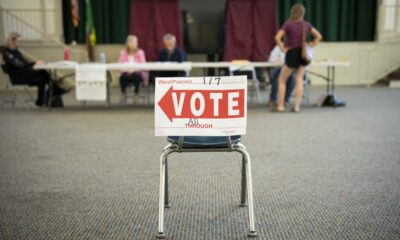News from the South - Arkansas News Feed
Arkansas religious rights bill augurs more than just a clarifying guide
Arkansas religious rights bill augurs more than just a clarifying guide
by Sonny Albarado, Arkansas Advocate
February 27, 2025
Sen. Alan Clark told his colleagues Tuesday he was initially skeptical about Senate Bill 223, which would “Create the Religious Rights at Public Schools Act.”
I too was skeptical. But unlike the Republican senator from Lonsdale, who ultimately voted for the bill, I remain skeptical.
The legislation would require public school districts and open charter schools to distribute at the beginning of each school year a copy of the act alerting students, parents and staff that they have “broad religious freedom” under the U.S. Constitution and First Amendment case law under the U.S. Supreme Court.
Among the rights the bill spells out are the ability to pray silently or out loud, individually or in groups and through other activities permitted to other groups by the school, including forming clubs. Also enumerated in the bill is the right to “display, print, recite or discuss religious texts and religious beliefs” when a student has the discretion to choose a topic or person of interest.
The bill further makes clear that students and staff can “give a Bible or other religious text to any other person at the school.”
Bill sponsor Sen. Mark Johnson, R-Ferndale, assured his fellow senators that the legislation merely serves as a guide “to clarify religious rights at public schools” and doesn’t introduce any new rights.
Republican Sen. Breanne Davis of Russellville echoed Johnson, saying the bill is “solidifying what’s already law.”
“Students, parents and staff want to know what their religious freedoms are. There are situations … where teachers are fired, students get in trouble, and it’s because people do not know where these things are in law. … Nobody knows what their rights are,” Davis said.
If people don’t know what their rights are, it could be because schools aren’t teaching civics. But I suspect what’s going on here is that certain religious sects want free rein to inject their particular brand of religion into public schools.
Despite the senators’ assurances that the bill is innocuous and not insidious, I remain concerned that if the bill becomes law, certain deeply religious people will use it to browbeat students and teachers into accepting their version of Christianity as the one true religion.
And like Democratic Sen. Stephanie Flowers of Pine Bluff, I see the bill as potentially disruptive to public education and public schools.
In speaking against the bill, Flowers delivered a disquisition on Article 14 and Amendment 53 of the Arkansas Constitution, which promise the state will “ever maintain a general, suitable and efficient system of free public schools.”
GET THE MORNING HEADLINES.
“It’s a bill that lends itself to indoctrinating young vulnerable, impressionable children,” she said. “When I talk about the possibility of indoctrination, I’m concerned about these documents of historical significance that are of a religious nature.”
She cited as an example a 1956 publication, Arkansas Faith, published by the White Citizens Council of Arkansas, noting that the subscription form declares subscribers to be white Christians who will oppose integration by any legal means necessary.
Flowers also said she didn’t think the bill was appropriate for public schools.
“It emboldens us to have religious rights outweigh and overpower our educational rights for our children.”
Johnson disagreed with Flowers, saying, “What we have here is a failure to communicate.” The bill “simply affirms existing religious rights. It’s not attacking anyone’s beliefs or establishing any beliefs.”
Republican Sen. Missy Irvin of Mountain View described herself as a deeply Christian person, but opposed the bill.
Irvin remembered being told by a fellow fifth-grader in her Catholic school that her parents weren’t going to heaven because “it’s easier for a camel to go through the eye of a needle than for a rich man to go to heaven.”
“That deeply offended me,” she said.
“Growing up Catholic, do you know how many times I was told I was going to hell because we were baptized as babies? From people that went to Baptist churches?” Irvin asked.
“I’m sorry but I just don’t think you bring people to Christ by beating them over the head with a Bible. I don’t think that’s right.”
She also described the bill as unnecessary: “You can do this already.” Her four children, who attend public schools, “pray all the time,” she said. “They carry Bibles in their backpacks. … This is not a problem, and it should not be in this law.”
While SB 223 carefully notes that “other religious texts” can be studied or read and shared in schools as well as the Bible, the language of the bill is clearly Christian-centric.
Johnson maintained that the legislation stays true to the First Amendment and is inclusive of all faiths.
“The First Amendment is messy,” Clark said. “We are a messy country. … Sometimes we don’t just disagree, we really disagree.
“I am very against the establishment of religion. [But] saying you can pray and this is what you will pray are two very different things.”
Clark is right about that, but SB 223 leaves too much room for someone in authority to tell students and teachers what they must pray.
YOU MAKE OUR WORK POSSIBLE.
Arkansas Advocate is part of States Newsroom, a nonprofit news network supported by grants and a coalition of donors as a 501c(3) public charity. Arkansas Advocate maintains editorial independence. Contact Editor Sonny Albarado for questions: info@arkansasadvocate.com.
The post Arkansas religious rights bill augurs more than just a clarifying guide appeared first on arkansasadvocate.com
News from the South - Arkansas News Feed
“We cannot hide anymore” Group protests in Springdale against immigration policies
SUMMARY: Hundreds of people protested in Springdale, Arkansas, calling for better recognition of immigrants and their contributions to the state. The protest was organized by a group aiming to challenge negative stereotypes of immigrants, particularly undocumented individuals. They argued that immigrants have significantly grown the economy and brought diversity to Arkansas. State Representative Aaron Pilkington acknowledged the value of legal immigrants but expressed concerns about the impact of illegal immigration on state resources. The protest also addressed issues at Tyson, where workers fear retaliation for speaking out. The march began at Murphy Park and ended at Luther George Park.

A group gathered in Springdale on Monday to speak out against immigration
Subscribe to 40/29 on YouTube now for more: http://bit.ly/PTElbK
Get more Northwest Arkansas news: http://www.4029tv.com
Like us: http://facebook.com/4029news
Follow us: http://twitter.com/4029news
Instagram: https://www.instagram.com/4029news/
News from the South - Arkansas News Feed
Trump to announce more tariffs on 'Liberation Day'
SUMMARY: President Trump has declared April 2nd as “Liberation Day,” during which he will announce new tariffs on imports from countries that tax American-made products. This initiative aims to support U.S. manufacturers; however, economists warn that American consumers may face increased prices. A 25% tax on imported vehicles and auto parts will begin Thursday, encouraging American car production. Trump officials predict the tariffs will generate over $6 trillion over the next decade, asserting that only companies will be affected. Despite a CBS News poll indicating that 72% of respondents expect price hikes, Trump remains unconcerned about potential consumer costs, emphasizing support for domestic manufacturing.

Trump has declared April 2 as “Liberation Day” saying that is the day he is going to put in new tariffs on countries around the world.
News from the South - Arkansas News Feed
Arkansas town hit hard by tornado making progress
by Ainsley Platt, Arkansas Advocate
March 31, 2025
Cave City was quiet last week.
The day after a high-end EF-3 tornado ripped through the small Sharp County town with 165-mile-per-hour winds on March 14, the main stretch had been abuzz with volunteers, heavy machinery and people sifting through what remained of their homes, businesses and storage units.
Fifteen tornadoes touched down in Arkansas during the March 14-15 severe weather event, according to the National Weather Service. Three people were killed in neighboring Independence County by the same tornado that devastated Cave City. That tornado was also the longest-tracked tornado in Arkansas since 2008, according to the weather service, remaining on the ground for over 80 miles — something the service noted as being “exceptionally rare” for a tornado in Arkansas.
Fast forward a week and a half, and the atmosphere in town has changed. Power lines no longer litter the sidewalk on one side of Main Street. People weren’t slowing in their cars, gawking and taking videos on their phones as they drove past the destruction. Cell service had been restored, even if it was somewhat spotty.
The cleanup had made remarkable progress, even after a week that began with a tornado and continued with whipping winds and fires that burned homes in an already-devastated area.
The remains of the town’s pharmacy — totalled by the tornado — are gone. Only a concrete pad and a small pile of rubble remain. The church and the grocery store are surrounded by fences, their roofs covered with tarps and sheet metal to keep out future rain. An excavator began tearing into a brick house next door to the grocery store, pulling down what remained of its roof.
Other than people operating heavy machinery — clearing debris and trees — not many people were walking around.
Irma Carrigan, who runs the Crystal River Cave Tours and Motel, said the day after the storm that she wasn’t convinced the hordes of volunteers and support that arrived in town after the storm would last. But on Wednesday, a week and a half after the tornado that totaled her car and pulled down a massive tree in her yard, crushing one of the many small buildings on her property, Carrigan said she’d been pleasantly surprised by just how much people wanted to help, noting that she hadn’t heard one complaint from those who had arrived to offer assistance.
“It has all been very positive, very caring people,” Carrington said. “They set up food centers for different places. We didn’t have to cook during all of that.”
“The volunteerism is just phenomenal,” Carrington said. Still, sometimes it could be overwhelming, she noted, being asked by volunteers how to help when those impacted themselves still weren’t sure.
“You just look ignorant to them because you’re just saying, ‘I don’t know,’” Carrington said.
The waves of volunteers ebbed about five days after the storm, Carrigan reported, but she was grateful for the help she got. A nonprofit brought in a crane, cut up the huge tree into chunks, and helped haul it onto a family friend’s truck. Some roofers reattached a part from her roof that had blown off in the storm.
Still, other things have been slow coming. Carrigan said that as of Wednesday, they were still being told they had to boil their water. Their internet only returned two days prior, and cell service wasn’t always reliable.
In the aftermath of the storm, sleep was sometimes hard to come by.
“Your brain won’t turn off,” Carrigan said. “I think mentally, you can’t shut it off. You’re still thinking, ‘What am I going to be doing tomorrow? What can I do?’ You just continue to pray that you’ll get guidance and where you need to go next.”
Walking down one of the roads that branched off from Main Street, Carrigan pointed to her neighbors’ houses. The white, two-story, former boarding house next to hers was the oldest in town, she said, and one of its occupants was on hospice. It was badly damaged.
Next door to it was a smaller house, the back of it torn open. Those neighbors, Carrigan said, were trapped under the rubble of their home for hours after the tornado hit. One of them was over 90 years old. She said she’d heard that the property had already been sold to someone else.
The yellow house even farther down was occupied by another elderly neighbor in their 90s, Carrigan reported. They planned to repair the damage, she’d heard.
Another neighbor will tear down and put in a mobile home, Carrigan said. Yet another told Carrigan they were considering a modular home.
“He said, ‘I’m too old to build. I’m too old to rebuild,’” Carrigan said of the neighbor who was considering a mobile home. “And he said, ‘I want something; I don’t want to wait two or three years to get it.’”
Some people were scared to even clean their windows until their insurance appraisers showed up, Carrigan said, leaving some in a state of limbo.
Carrigan expressed support for a federal disaster declaration, which Gov. Sarah Huckabee Sanders requested last week. Sander asked for additional federal help over the weekend.
“I would think they would,” Carrigan said of the federal government helping with disaster recovery. “I mean, I can’t imagine a disaster any worse.”
However, the Federal Emergency Management Agency, which normally manages federal disaster responses, is in the crosshairs of the Trump administration as one of its targets to be shut down, with the Washington Post reporting that Department of Homeland Security Secretary Kristi Noem expressed support for removing FEMA’s role in recovering from disasters by October.
It’s unclear how such an action would impact a federal disaster response in Arkansas if the declaration is approved. Stateline reported last month that disaster experts and states have said that they aren’t able to take on the role FEMA currently fills.
Carrigan wasn’t the only one who would like to see the disaster declaration approved. Brandi Schulz, the executive director of the Cave City Area Chamber of Commerce, said the money that would be available to both businesses and residents would help with the recovery.
“From a chamber director perspective, I know that (a federal disaster declaration) would open up some options for our businesses that were impacted,” Schulz said. “I know that there were going to be more options, supplemental options, outside of insurance if that does go through, so in that regard, I am hoping that we can get more assistance to our businesses and also to our residents.”
Schulz described Cave City as a “very DIY community,” and said that it, combined with the support of volunteers and donors, meant that the city would likely be in “a very good place” on debris removal within the next week. Roughly 59 people have been displaced by the tornado in the area, Schulz estimated.
Taking care of the physical needs of those who were affected doesn’t just mean helping clear debris, however. Schulz said the wife of the town’s fire chief, whom the chamber director said “specializes in trauma debriefing,” has been offering resources for the community.
“I think the biggest thing is people knowing that they’re not alone, that we’re here for them,” Schulz said. “And I think we’ve shown that in the last week or so.”
Carrigan expressed some frustration with communication from state and local authorities, even as she said she appreciated what they were doing and was satisfied with the rate at which cleanup and recovery had been happening. She heard that state money was available to those impacted to help with storm recovery, but wasn’t able to figure out how to apply. She said the Red Cross opened a shelter, only to close it 48 hours later.
“I went up to the Assembly of God to check out, try to find this Red Cross and they said, ‘Well, they were here, but nobody came up here to use their services,’” Carrigan said. “And I said, ‘Well, honey, nobody knew that they were here.’”
Schulz said local officials made efforts to reach people who weren’t able to get online information, at one point distributing fliers, she said.
The Red Cross confirmed it closed the shelter due to lack of use.
“We had some families that expressed interest, and then had found other places to say,” Red Cross regional spokesperson Sharon Watson said, adding that they had been coordinating with local faith leaders and town officials to get the word out. “Some had requested hotels, and we didn’t have hotel vouchers to offer because we had a shelter set up, and our shelter was available so therefore they opted to find other places to stay, which we completely understand.”
Watson noted that the shelter wasn’t the only way it was helping the community. On Thursday, the Red Cross opened several “Multi-Agency Resource Centers” in conjunction with the Arkansas Voluntary Organizations Active in Disaster for those affected by the tornado outbreak, designed to serve as a “one-stop shop” for residents to get answers from state and local authorities about disaster assistance.
The MARCs were open from Thursday to Sunday in different cities — Diaz on Thursday, Cave City on Friday, Melbourne on Saturday, and Pocahontas on Sunday.
Meanwhile, management of volunteers and donations was handed over to Eight Days of Hope, a Christian nonprofit, after being managed by local officials such as Schulz.
Gale Manning, the rapid response manager for the Cave City relief efforts, said the organization will be on the ground until April 5. Volunteers have been helping cut up and haul off trees, he said, to help make the area safer. He said roughly 70 to 80 people had been volunteering on the weekdays, with volunteers coming from as far away as Alaska.
“They’re devastated,” Manning said of the people who had been impacted by the storm. “They’ve lost their life savings, belongings. But, you know, as the days go on, they feel a bit better. Again, we share the gospel and we let them know that God’s in control and that he knows what’s going on, and he promised us all a better day.”
Arkansas Advocate is part of States Newsroom, a nonprofit news network supported by grants and a coalition of donors as a 501c(3) public charity. Arkansas Advocate maintains editorial independence. Contact Editor Sonny Albarado for questions: info@arkansasadvocate.com.
The post Arkansas town hit hard by tornado making progress appeared first on arkansasadvocate.com
-

 News from the South - Florida News Feed6 days ago
News from the South - Florida News Feed6 days agoFamily mourns death of 10-year-old Xavier Williams
-

 News from the South - Alabama News Feed7 days ago
News from the South - Alabama News Feed7 days ago1 Dead, Officer and Bystander Hurt in Shootout | March 25, 2025 | News 19 at 9 p.m.
-

 News from the South - Alabama News Feed5 days ago
News from the South - Alabama News Feed5 days agoSevere storms will impact Alabama this weekend. Damaging winds, hail, and a tornado threat are al…
-

 News from the South - Alabama News Feed4 days ago
News from the South - Alabama News Feed4 days agoUniversity of Alabama student detained by ICE moved to Louisiana
-

 News from the South - Louisiana News Feed6 days ago
News from the South - Louisiana News Feed6 days agoSeafood testers find Shreveport restaurants deceiving customers with foreign shrimp
-

 News from the South - Oklahoma News Feed3 days ago
News from the South - Oklahoma News Feed3 days agoTornado watch, severe thunderstorm warnings issued for Oklahoma
-

 News from the South - Oklahoma News Feed6 days ago
News from the South - Oklahoma News Feed6 days agoWhy are Oklahomans smelling smoke Wednesday morning?
-

 News from the South - West Virginia News Feed6 days ago
News from the South - West Virginia News Feed6 days agoRoane County Schools installing security film on windows to protect students








































